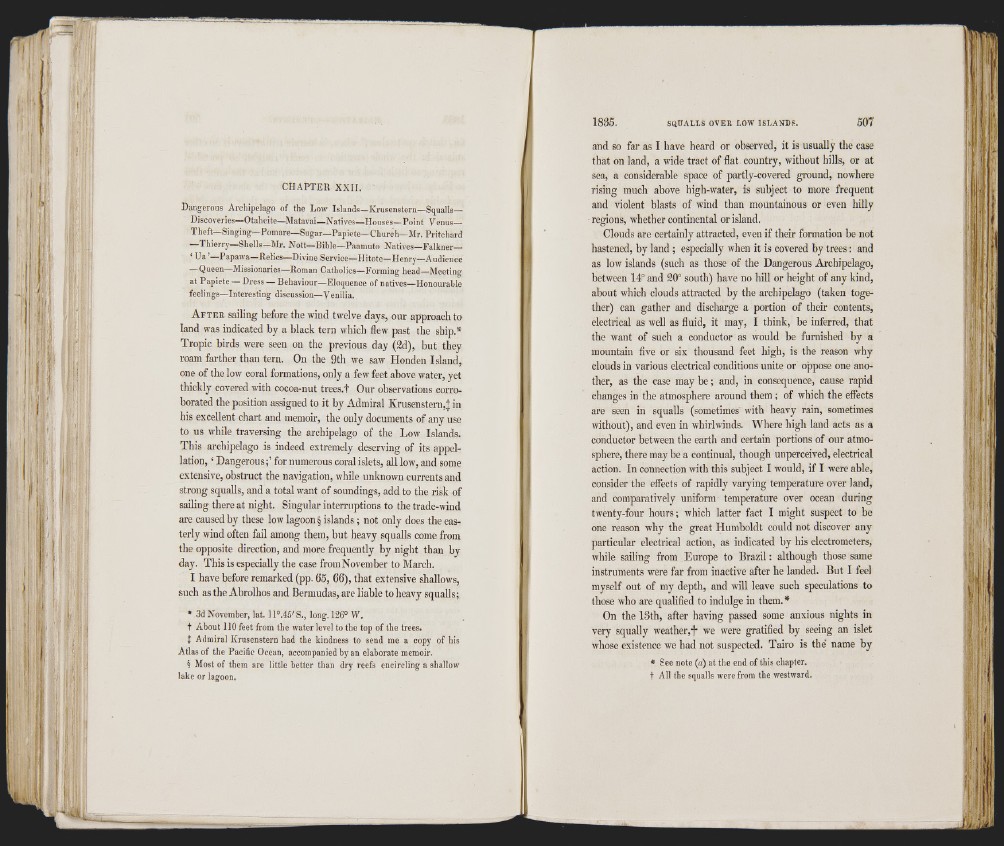
li
j j ¡If
•!' li'iL
CHAPTER XXII.
Dangerous Archipelago of the Low Islands—Krusenstern—Squalls—
Discoveries—Otaheite—Matavai—Natives—Houses—Point Venus—
Theft—Singing—Pomare—Sugar—Papiete—Church—Mr. Pritchard
—Thierry—Shells—Mr. Nott—Bible—Paamuto Natives—Falkner—
‘ Ua’—Papawa—Relics—Divine Service—Hitóte—Henry—Audience
— Queen—Missionaries—Roman Catholics—Forming head—Meeting
at Papiete — Dress — Behaviour—Eloquence of natives—Honourable
feelings—Interesting discussion—Venilia.
A f t e r sailing before the wind twelve days, our approach to
land was indicated hy a black tern which flew past the ship.*
Tropic birds were seen on the previous day (2d), but they
roam farther than tern. On the 9tii we saw Honden Island,
one of the low coral formations, only a few feet above water, yet
thickly covered with cocoa-nut trees.t Our observations corroborated
the position assigned to it by Admiral Krusenstern,] in
his excellent chart and memoir, the only documents of any use
to us while traversing the archipelago of the Low Islands.
This archipelago is indeed extremely deserving of its appellation,
‘ Dangerous;’ for numerous coral islets, all low, and some
extensive, obstruct the navigation, while unknown currents and
strong squalls, and a total want of soundings, add to the risk of
sailing there at night. Singular interruptions to the trade-wind
are caused by these low lagoon § islands ; not only does the easterly
wind often fail among them, but heavy squalls come from
the opposite direction, and more frequently by night than by
day. This is especially the case from November to March.
I have before remarked (pp. 65, 66), that extensive shallows,
such as the Abrolhos and Bermudas, are liable to heavy squalls;
* 3d November, lat. 11°.45' S., long. 126° W.
t About 110 feet from the water level to the top of the trees.
I Admiral Krusenstern had the kindness to send me a copy of his
Atlas of the Pacific Ocean, accompanied by an elaborate memoir.
§ Most of them are little better than dry reefs encircling a shallow
lake or lagoon.
and so far as I have heard or observed, it is usually the case
that on land, a wide tract of flat country, without hills, or at
sea, a considerable space of partly-covered ground, nowhere
rising much above high-water, is subject to more frequent
and violent blasts of wind than mountainous or even hilly
regions, whether continental or island.
Clouds are certainly attracted, even if their formation be not
hastened, by land ; especially when it is covered by trees : and
as low islands (such as those of the Dangerous Archipelago,
between 14° and 20° south) have no hill or height of any kind,
about which clouds attracted by the archipelago (taken together)
can gather and discharge a portion of their contents,
electrical as well as fluid, it maj’, I think, be inferred, that
the want of such a conductor as would be furnished by a
mountain five or six thousand feet high, is the reason why
clouds in various electrical conditions unite or oppose one another,
as the case may be ; and, in consequence, cause rapid
changes in the atmosphere around them ; of which the effects
are seen in squalls (sometimes with heavy rain, sometimes
without), and even in whirlwinds. Where high land acts as a
conductor between the earth and certain portions of our atmosphere,
there may be a continual, though unperceived, electrical
action. In connection with this subject I would, if I were able,
consider the effects of rapidly varying temperature over land,
and comparatively uniform temperature over ocean during
twenty-four hours ; which latter fact I might suspect to be
one reason why the great Humboldt could not discover any
particular electrical action, as indicated by his electrometers,
while sailing from Europe to Brazil ; although those same
instruments were far from inactive after he landed. But I feel
myself out of my depth, and will leave such speculations to
those who are qualified to indulge in them. *
On the 13th, after having passed some anxious nights in
very squally weather,# we were gratified by seeing an islet
whose existence we had not suspected. Tairo is the name by
* See note (a) at the end of this chapter.
t All the squalls were from the westward.